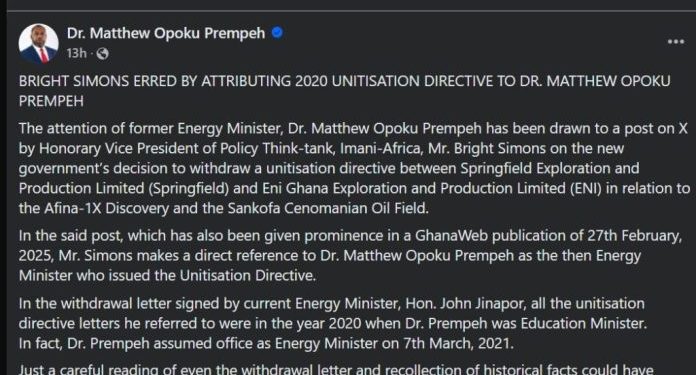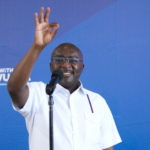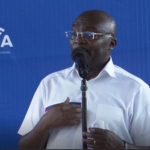Dr. Matthew Opoku Prempeh, Ghana’s former Energy Minister, has demanded an immediate retraction and apology from Bright Simons, Vice President of policy think tank IMANI Africa, over what he calls “factually inaccurate” claims linking him to a controversial 2020 oil unitisation directive.
The dispute stems from a social media post by Simons, later amplified by GhanaWeb, which alleged Prempeh’s involvement in mandating the merger of Springfield Exploration and Production Limited and Eni Ghana Exploration and Production Limited (ENI) during his tenure.
In a sharply worded rebuttal, Prempeh clarified that he was appointed Energy Minister on March 7, 2021, nearly a year after the disputed directive was issued in 2020. At the time, he served as Education Minister under former President Nana Akufo-Addo. “A careful reading of even the withdrawal letter and recollection of historical facts could have saved Mr. Simons from this avoidable error,” Prempeh stated, accusing Simons of failing to verify timelines before making “reckless” allegations.
The unitisation directive, recently revoked by the current Energy Minister John Jinapor, had required Springfield and ENI to combine their adjacent offshore oil fields for joint operations—a move critics argued favored Springfield. Prempeh emphasized that while public discourse on policy decisions is welcome, it must be grounded in “accuracy, circumspection, and decorum.”
Simons, known for his outspoken critiques of Ghana’s energy and governance policies, has yet to publicly retract the claim. His initial post on X (formerly Twitter) tied Prempeh to the directive’s issuance, a narrative Prempeh insists distorts his record. In a brief response to Prempeh’s demand, Simons acknowledged the exchange but did not clarify whether he would issue an apology, stating only that he “takes note of the concerns raised.”
Brotherly Tensions in Policy Circles
The clash highlights growing tensions between Ghana’s political elites and civil society watchdogs, particularly over accountability in the energy sector. Prempeh, a prominent figure in the ruling New Patriotic Party (NPP), has faced scrutiny before over oil and gas decisions, including stalled projects and contract transparency. Simons, meanwhile, has built a reputation for dissecting government policies, often sparking heated debates.
Analysts note that the unitisation reversal itself remains contentious. While the current administration frames the withdrawal as a corrective measure to “restore fairness,” industry experts warn it could deter investor confidence in Ghana’s upstream sector. Neither Springfield nor ENI has commented on the policy shift or the Prempeh-Simons spat.
As the war of words escalates, the episode underscores a broader challenge: balancing robust public scrutiny with factual precision in Ghana’s increasingly polarized political landscape. For now, all eyes remain on whether Simons will retract—or double down—on his claims.
See below:
Since some of you are asking:
*My response to Mr. Matthew Opoku Prempeh, former Minister of Energy*
I have seen a statement from the former Energy Minister effectively washing his hands off the whole embarrassing spectacle that is the forced unitisation saga. His statement is…
— Bright Simons (@BBSimons) February 27, 2025
- President Commissions 36.5 Million Dollars Hospital In The Tain District
- You Will Not Go Free For Killing An Hard Working MP – Akufo-Addo To MP’s Killer
- I Will Lead You To Victory – Ato Forson Assures NDC Supporters
Visit Our Social Media for More





